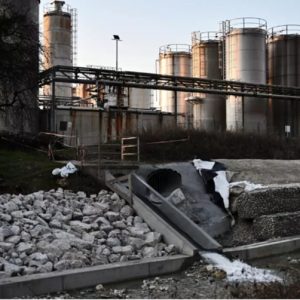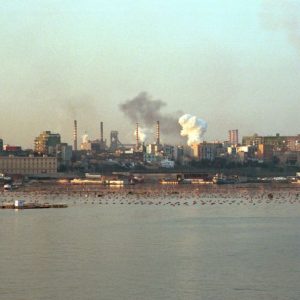Managers of a chemical plant accused of knowingly contaminating water are on trial in Italy. The case is one of Europe’s biggest environmental disaster lawsuits.
The now-closed Miteni factory near Vicenza allegedly polluted one of Europe’s largest groundwater basins with PFAS. These “forever chemicals” never break down.
PFAS have been used since the late 1940s for nonstick, waterproof, and stain-resistant coatings on frying pans, umbrellas, carpets, and dental floss. Chronic exposure, even at low levels, has been linked to liver damage, high cholesterol, weakened immunity, low birth weights, and some cancers.
Over 200 civil plaintiffs have joined the trial, which began in 2021. A verdict is expected in May or June.
Population of up to 350,000 affected
Matteo Ceruti, a lawyer for some affected families, told AFP it was “one of the biggest environmental disaster in history… (with) an affected population of up to 350,000 people”.
Local mothers helped drive the case after discovering PFAS in their blood. “With great bitterness we found out that they got in via the taps in our house, from the foods in our gardens, from the barnyard animals that we raised to give healthy food to our children,” said Giovanna Dal Lago, a mother of five.
“It was a blow to the heart,” Dal Lago, a plaintiff, told AFP. “How could a mother think that she had poisoned her children without knowing, without having a choice?”
The prosecution alleges that the Miteni plant in Trissino, which produced PFAS from 1968, leaked chemical-laced wastewater into a waterway. That water then fed into other waterways, polluting an area spanning Vicenza, Verona, and Padova.
Fifteen managers from Mitsubishi, International Chemical Investors (ICIG), and Miteni are accused of contaminating nearly 200 square kilometres of drinking water and soil. If found guilty, they could face 15 years in prison. Plaintiffs are also seeking compensation.
Lawyers for the managers have not commented, but the defence may argue that regulations at the time were unclear.
Contamination discovered in 2013
The contamination was discovered in 2013 when Italy’s environment ministry ordered tests of the Po River following a 2006 European study on chemical exposure in rivers. The Po had the highest concentration of PFOA, a known carcinogen. Further investigations traced the pollution to Miteni.
At the time, no Italian or EU regulations set limits for PFAS in drinking water, according to a regional World Health Organization (WHO) report. The Veneto region initially received advice from Italy’s national health institute (ISS) and the government that there was no “immediate risk to the population”. However, they were told to install water treatment filters.
Also read: Third of Italy’s water is over pollution levels
Unusually high cancer rate
Local doctor Vincenzo Cordiano, a cancer and blood specialist, noticed an unusually high cancer rate in the contaminated area. As regional head of the International Society of Doctors for the Environment (ISDE), he was aware of a high-profile PFAS pollution case in the United States. “Seeing an increased frequency in… diseases which could involve these molecules” in Italy raised alarms, he told AFP. Regional data showed a higher number of deaths and “excess mortality that could be explained by PFAS”.
The discovery led to protests, including from the activist group “Mums Against PFAS” (Mamme No PFAS). Dal Lago remains wary of the official response. “We are still terrified of home tap water,” she said.
Greenpeace Italia, a civil plaintiff, argues that failure to clean up the Miteni site means it “continues to pollute”. The group also claims authorities are not testing local food or livestock regularly, which could mask further contamination. “We do not have a clear picture of the contamination of food products that come from these territories,” said Giuseppe Ungherese, Greenpeace’s pollution expert.
“The lack of controls could potentially expose thousands of citizens, not just Italians but also Europeans,” to consuming forever chemicals unknowingly, he said.




